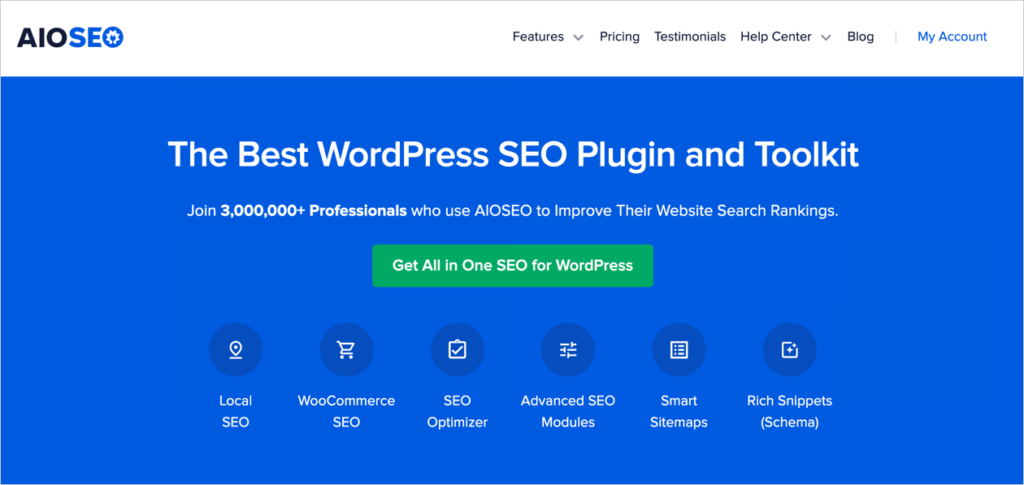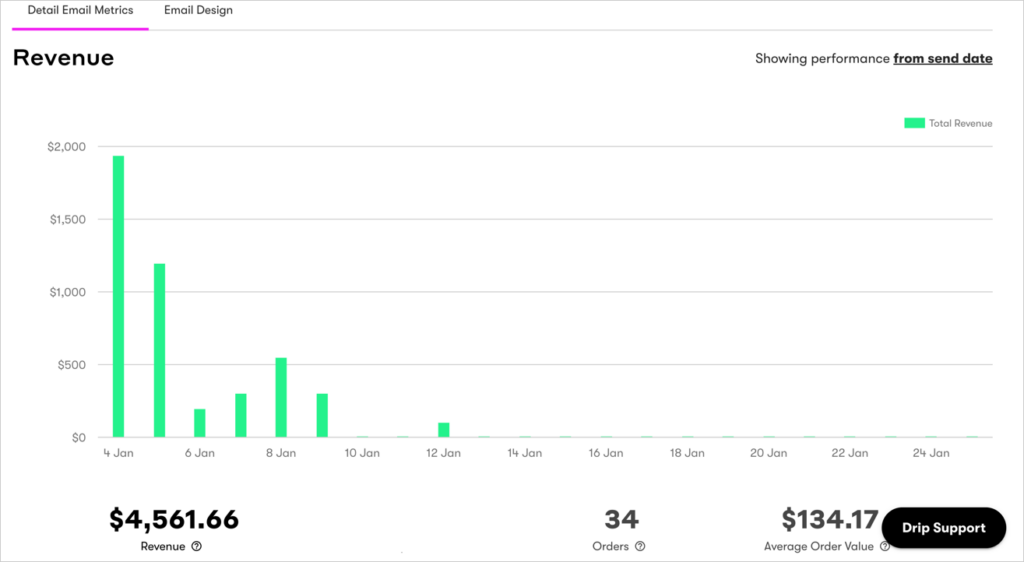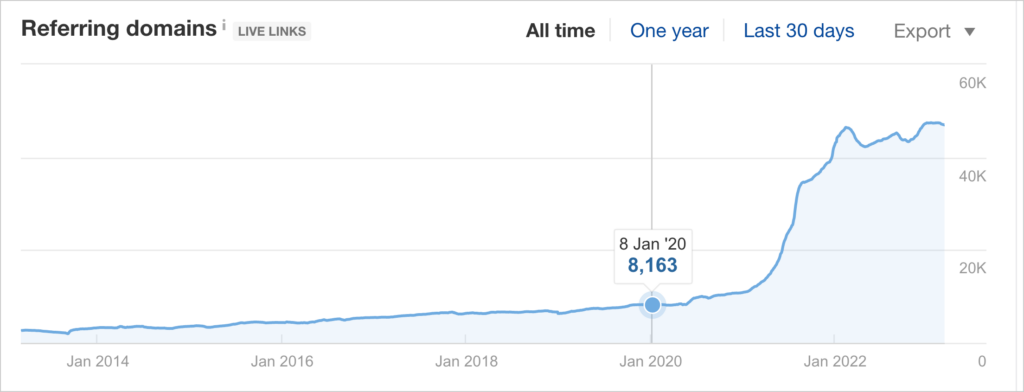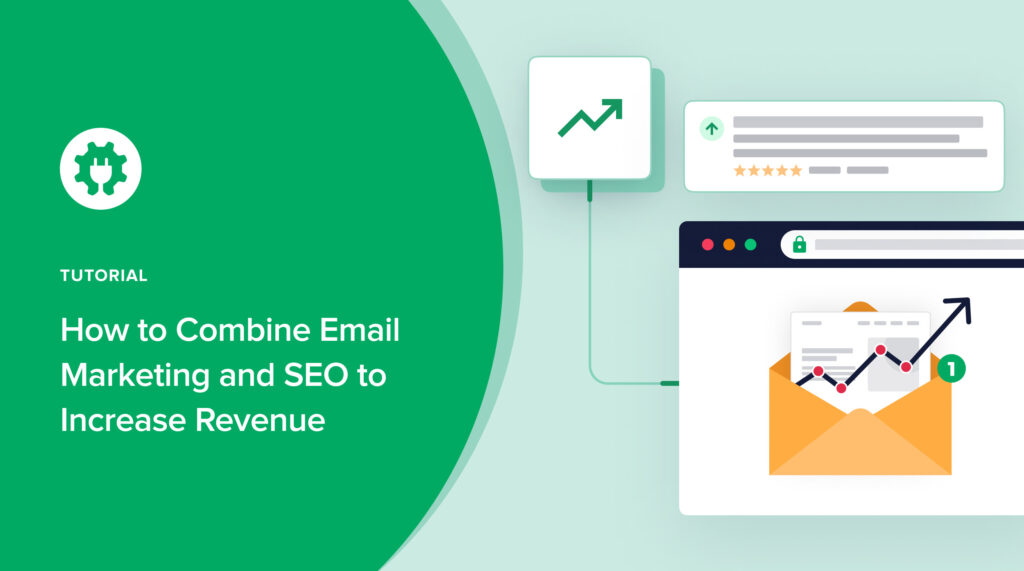Email marketing and SEO may seem unrelated. But they can work together to yield impressive results.
Let’s explore what’s possible for your business when you include email marketing in your growth strategy.
In This Article
4 Ways to Boost Revenue by Combining Email Marketing and SEO
With email generating an average return of $36 for every $1 spent, it continues to be a favored marketing channel across industries.
While your SEO efforts are focused on search engine rankings, email marketing provides a hidden-in-plain-sight opportunity to boost your SEO return on investment.
Additionally, email campaigns can attract backlinks, creating a virtuous cycle of higher rankings and revenue.
Here are 4 primary ways you can compound business returns by harmonizing your email marketing strategy with your SEO strategy.
1. Use SEO to Grow Your Email List
Use an SEO Plugin: Before publishing content, get in the habit of optimizing your page for SEO.
This will not only help your pages rank higher, but it’s also crucial for attracting qualified prospects and growing your email list.
The easiest way to optimize WordPress pages for SEO is to use an SEO plugin. We recommend All in One SEO (AIOSEO).
This beginner-friendly plugin will automatically analyze your pages and show you exactly what to do to improve them.
This takes a lot of the guesswork out of search engine optimization.
All in One SEO is an established plugin with thousands of 5-star reviews on WordPress.org. Currently, over 3 million site owners are using the plugin.

2. Place Email Sign-up Forms Near the Top
Many website visitors don’t scroll down a page. So, if your call-to-action (CTA) is buried beneath paragraphs, you’re losing out on conversions. And that’ll be reflected in your bounce rate.
Capturing email sign-ups is vital to engaging those considering what your business offers. Not everybody is ready to buy today.
Placing your sales CTA and newsletter sign-up links near the top of the page is essential.
Pro tip: Check your website layout on a mobile phone. Can mobile users easily access your sign-up form?
Need an email sign-up form for WordPress? Check out WPForms’ ready-to-go templates.
3. Earn Secondary Revenue from Content
While high-quality SEO-optimized content will earn sales from organic traffic, email marketing opens up a secondary revenue stream.
Not all articles you create will rank high in search engine results pages (SERPs). Rankings depend heavily on the competition. And if you’re choosing keywords that are difficult to rank for, that can hinder your SEO efforts.
But don’t fret. Promoting underperforming articles via email can turn a dud into a revenue-generating dynamo.
After all, your email list comprises a qualified audience that’s already said “Yes” once. They’re the perfect audience for your targeted content.
Pro tip: Make sure you choose an email marketing platform like Drip or ConvertKit that provides revenue metrics for your campaigns.

4. Acquire Backlinks via Email
Along with revenue, promoting content via email campaigns often increases backlinks to an article. That’s not surprising. People are eager to share helpful content on their sites and social media.
Ask for links: You can also design and automate campaigns to target bloggers, editors, and publishers to acquire quality backlinks.
Backlinks are a significant ranking factor and can trigger a virtuous cycle. As more people link to an article, it rises in search engine results. Then, more people discover it and link to it.
Well-designed and executed link-building campaigns often produce hockey stick-like growth in referring domains and backlinks.
This exponential uptick can drive valuations for a website, resulting in a profitable sale of an online business.

Need a website or landing page? You can scaffold up a WordPress site quickly by using the SeedProd builder.
Bonus Tips on Email Marketing and SEO
While reviewing ways to boost the synergy between SEO and your email marketing programs, keep these tips in mind.
- Choose “Easy” keywords: When planning content, it’s crucial to choose keywords (topics) that are rated “Easy” or “Possible” to rank for. This is even more important for newly launched businesses.
- Use content to solve problems: Show visitors how to solve problems with your product. “How-to” content is not only popular, it’s a big money-maker.
- Provide comparison reviews: Create content that compares your solution to the competition’s. This can move people from thinking about what you offer to buying.
Q&A on Email Marketing and SEO
Now that we’ve covered ways that email marketing and SEO strategies can overlap to accelerate wins; you likely have more questions.
We’ve answered a few here. If you have other questions, please drop them in the comments below. We’d be delighted to be of assistance.
Does SEO apply to email marketing?
SEO doesn’t apply directly to email marketing unless you plan to publish emails as standalone pages. (Some legacy email providers, like Constant Contact, offer the option to publish your email on a subdomain of theirs.)
This tactic isn’t as popular as it used to be. And we think you’re better off focusing email content on converting the reader, not optimizing it for ranking in search engine results pages.
How do I track revenue earned from email?
Most email marketing platforms, like Drip and ConvertKit, provide revenue metrics. For example, Drip provides revenue earned per email campaign and average order value.
Additionally, you can filter by time period to see revenue trends and review top campaigns.
Drip also compares revenue attributed to email and total online revenue.
Revenue attribution models will vary between platforms and are typically based on tracking campaign URLs and related purchases made during a strict time frame.
While no attribution model is perfect, they can provide useful insights.
What is content marketing?
Content marketing uses digital content to generate awareness, attract interest, and grow sales. Typical tactics include blogging and SEO, email marketing, free downloads, social media, webinars, podcasting, and influencer marketing.
Since all marketing is content, the term “content marketing” may seem redundant.
Resources on Email Marketing and SEO
- SEO Secrets Used by the Pros to Grow Revenue
- What is Email Marketing: The Complete Guide
- How to Run a Successful Email Marketing Campaign
- How to Create an Email Newsletter in WordPress
- Keyword Difficulty in SEO: What is it and How to Use it
- Topic Clusters: The Secret Weapon of SEO Pros
Email Marketing and SEO: Next Steps
Now that you know how email marketing and SEO can be used to compound business results, what’s next?
Explore how SEO differs from social media so you can better allocate resources. And take our secrets for using SEO to grow revenue.
Also, explore email marketing best practices, including automation, personalization, segmentation, and compelling subject lines.
To learn more about search engine optimization, subscribe to our YouTube Channel. You’ll find great step-by-step tutorials there. You can also follow us on X (Twitter), LinkedIn, or Facebook to stay in the loop.
Disclosure: Our content is reader-supported. This means if you click on some of our links, then we may earn a commission. We only recommend products that we believe will add value to our readers.


Tu artículo reciente fue justo lo que necesitaba. Gracias por tu dedicación a proporcionar información valiosa.
¡Estamos encantados de que haya encontrado útil la información!